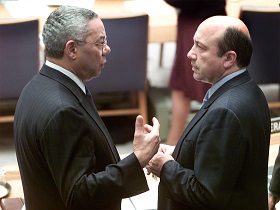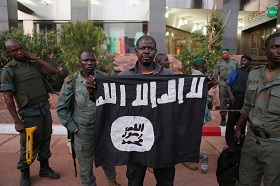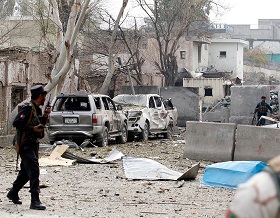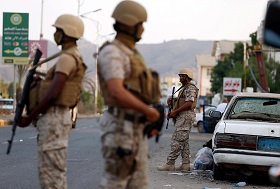On September 11, 2001, for the first time since 1941, the United States of America, the world’s most powerful state suffered an attack on its own territory. Moreover, the events of 9/11 became the largest act of terror in the history of humankind. That day, nearly 3,000 people tragically lost their lives in New York, Washington, DC, and Pennsylvania.
On the evening of that same day, the US President George W. Bush called it an act of terror and vowed to “to defend freedom and all that is good and just in our world.” Very soon, it was discovered that the terrorists were members of al-Qaeda, an Islamist terrorist group led by Osama bin Laden.
The emergence of a major external threat capable of causing significant damage to the US within its own territory led to an unprecedented unification of the American nation and to the unquestioning support of the state in eliminating this mortal danger. Essentially, the Congress gave President George W. Bush carte blanche to carry out any military operation.
The international community represented by the UN expressed complete solidarity with the US. In September 2001, the UN Security Council adopted Resolutions 1368 and 1373 condemning the 9/11 acts of terror and calling upon the entire world to come together in the face of the terrorist threat and to do everything in their power to eliminate it.
Never in its history had the US had such truly global support and compassion in its hour of grief. The expectations, too, were great; many experts believed that the events of 9/11 and the global community’s reaction to them offer a unique chance for positive changes in the world. Alas, the chance was lost. Happy dreams were soon dashed against Washington’s haughtiness and arrogance.
Benjamin Franklin: “Those who would give up essential Liberty, to purchase a little temporary Safety, deserve neither Liberty nor Safety.”
The 9/11 acts of terror shocked the American society deeply, as it had never before encountered such threats. The demand for reforms in security, primarily in domestic security, was unprecedented. Besides, the authorities whipped up the frenzy with their overall rhetoric of America being at war against terror. “Being at war” demanded decisive and harsh actions. The US instituted domestic reforms which also influenced global politics.
The authorities started by initiating an administrative reform, the largest one since the times of President Harry Truman; it resulted in creating the Department of Homeland Security that united several different agencies. The same large-scale reform introduced several new offices, including that of the Director of National Intelligence. The initial idea of joining intelligence and other classified information into a single system in order to receive a greater overall picture of events had a serious side effect: a greater number of people now had access to this information. Thus, the US soldier Bradley Manning deployed in Iraq leaked hundreds of thousands of documents from the Department of State and the Department of Defense to WikiLeaks. It was the largest single leak of classified and confidential information during the entire US history, and the leak made it much harder for American agencies to do their work abroad. For the first time, the world learned from the horse’s mouth, as it were, what the US thought of it. After such a debacle, hardly anyone would agree to a heart-to-heart with American officials. Most likely, it had negative consequences for the US intelligence operations as well.
In October 2001, the Congress quickly passed the USA PATRIOT Act [1] which greatly restricted rights and freedoms of American citizens in the name of security (nothing like that ever happened during the toughest stretches of the Cold war). Even though this document has been criticized many times by human rights activists, it existed, even if in a somewhat abridged form, until 2015. The USA FREEDOM Act which replaced it included several provisions from the Patriot Act. Edward Snowden, former employer of a subcontractor working for the US National Security Agency, told the world about American secret services conducting illegal surveillance under the Patriot Act, monitoring the lives of Americans as well.
Due to its domestic policy reforms, the world now perceived the US differently. Under the glib excuse of fighting terrorism, the US was gradually slipping from being the bastion of freedom, democracy, and human rights, to becoming a police state. It could not pass unnoticed by other countries.
The successes of the antiterrorist campaign
During that time, the US did succeed in some ways in fighting terrorism. However, those successes were limited to the areas where the West had a clear advantage over the rest of the world.
Firstly, the banking and financial sector underwent a reform aimed at preventing suspect transactions which could be intended to finance terrorism. Yet Hawala, an informal money transfer system popular in Muslim countries, a system based on trust between sender, recipient, and go-between, remained virtually untouched.
Secondly, secret services set up a system of exchanging sensitive information on terrorists and their activities. Yet the level of trust in this information could vary. For instance, in April 2013, a year before the acts of terror committed in Boston, Russia’s FSB sent their American counterparts information on the trip one of the Tsarnaev brothers made to a recruiting camp in the North Caucasus. The FBI mistakenly believed this information to be useless.
Thirdly, special emphasis was made on increasing control over weapons of mass destruction and dual-purpose materials that could be used by Islamist terrorist groups to implement their strategy of causing maximum damage to the enemy. In the fall of 2001, some American politicians and media received envelopes containing anthrax spores. Five of the people who contracted the deadly disease died. The case was never solved, since the main suspect committed suicide in 2008.
Fourthly, through military operations in Afghanistan and then in Iraq, al-Qaeda (which claimed responsibility for the 9/11 acts of terror) was virtually eliminated. In May 2011 in Pakistan, a team of US Navy SEALs killed Al-Qaeda’s leader, terrorist No. 1, Osama bin Laden.
The problems of the global war on terror
Statistics tells us that the results of a fifteen-year-long war on terror are not great. The number of victims of acts of terror grew ninefold between 2000 and 2014 – from 3,329 to 32,685 people. In 2014, acts of terror were committed in 123 out of 162 countries. Their number grew more than sevenfold – from 1,980 in 2001 to 14,786 in 2015.
Why have the terrorists become more active since the world started fighting them?
Firstly, the US went to war in Afghanistan and Iraq without a clear plan of action. And if the global community supported the Afghanistan operation as a just retaliation for the 9/11 events, then the Iraq operation (started under false pretenses) virtually crushed the international anti-terrorist coalition and split the previously united NATO. France and Germany were against the operation, and Washington was forced to coin a new phrase and call it “the coalition of the willing.” Today, acts of terror are being committed non-stop in Afghanistan and Iraq, their victims number in hundreds of thousands, not to mention the fact that American taxpayers paid trillions of dollars for the military campaigns which brought no tangible positive result.
Secondly, the US made a colossal mistake: instead of focusing on fighting Islamist groups, Washington and its allies began a parallel war on secular regimes first in Iraq and then in Syria. In both cases, the power vacuum was quickly filled up by terrorists who later united in the “Islamic State” (IS), and the national armies of Iraq and Syria cannot defeat it. Even the “Arab spring,” intended to become the triumph of democracy in the Arab world, bore fruit that was dubious at best. In Egypt, democratic elections brought into power Mohammed Morsi, a member of the radical Muslim Brotherhood; subsequently, Morsi was overthrown in a military coup. After the murder of Muammar Gaddafi, Lybia has gone into a half-life state and is plagued by unceasing internenice wars. In Yemen, the conflict between the authorities and Islamists has been going on for several years already. In fact, none of the operations carried out or initiated by the US in the last fifteen years can be called a success bringing freedom and prosperity. Moreover, the Islamist threat ‘mutated,” it became more diverse, and it spilled into new countries and regions.
Thirdly, none of the problems underlying the spread of terrorism has been solved. The countries of the Muslim world still feel excluded from the global processes. The number of Muslims supporting ISIS is on the rise. Surveys conducted in Arab countries’ capitals in late 2014 – early 2015 showed that 8.5 million people were active supporters of IS, and another 42 million (out of 370 million in 11 Arab countries) viewed its activity in a positive light. Fifteen years of antiterrorist campaign not only failed to improve the US relations with Muslim countries, they in fact led to the deterioration of those relations because of near-sighted policies which led to highly dubious results.
Fourthly, having started the “war on terror” without setting itself clear tasks and a precise definition of criteria for judging success, the US overestimated its capabilities. In fact, today we can state that Islamist terrorists succeeded in drawing the US into a long-term confrontation, a classical asymmetrical conflict where the strong opponent cannot achieve a military victory. Now the US is forced to play by others’ rules, without any prospects of gaining a quick victory, and it clearly undermines the US leadership. The American society is tired of the endless war on terror. The voices of isolationists sound louder and louder; they insist on limiting the US interference into global affairs. In particular, the US presidential candidate Donald Trump voices such ideas; he could be called a representative of a non-systemic opposition to the US political elite which has dominated since the end of the Cold war and has drawn the US into a series of exhausting conflicts. Apparently, even if Mr. Trump does not become President (both Hillary Clinton, the Democratic candidate, and the most conservative part of the Republic establishment are in the way), isolationist moods in the US will grow.
A long way uphill
Summarizing the results of the antiterrorist campaign that started on September 11, 2001, we can draw the following conclusions.
1. Terrorism is on the rise; the number of local Islamist groups fighting (sometimes successfully) against their countries’ governments is growing. Today, IS is the strongest enemy and it is spreading its influence even beyond the Middle East. Apparently, new acts of terror will be committed Europe, but they will most likely be a background for radical changes in the Muslim world. Sooner or later, the US will have to realize that military might will only exacerbate the terrorism problem, not solve it. Now a political solution to the problems accumulated over decades must be sought.
2. Most countries fearful of an American military intervention have learned the principal lesson of the Iraq and Lybia campaigns: only possession of WMDs is a deterrent for Washington. This is why on September 9, 2016, North Korea conducted its fifth nuclear weapons test over the last few years and caused a storm of protest in the global community. Pyongyang reasonably decided that UN sanctions are better than America’s hypothetical military intervention. Thus, Washington’s arrogant policy of unilateral actions led to deterioration of the rule of international law and to further cracks in the foundations of the non-proliferation regime.
3. The US will no longer be able to play the leading role in the antiterrorist coalition, regardless of its shape and form. Over the last fifteen years, the US has utterly lost the compassion of the global community and the image of terrorists’ main victim. Moreover, for many states, the US is now an aggressor whose actions lead to countless tragedies, destruction, and growth of terrorist activity. Alas, such is the principal result of the fifteen-year-long anti-terrorist campaign, which has largely devalued the loss of 3,000 lives on 9/11. The war on terror has to be begun anew, based on the current realities of an even more dangerous and unpredictable world.
1. USA PATRIOT Act. Its full title is: “Uniting and Strengthening America by Providing Appropriate Tools Required to Intercept and Obstruct Terrorism Act of 2001.”








